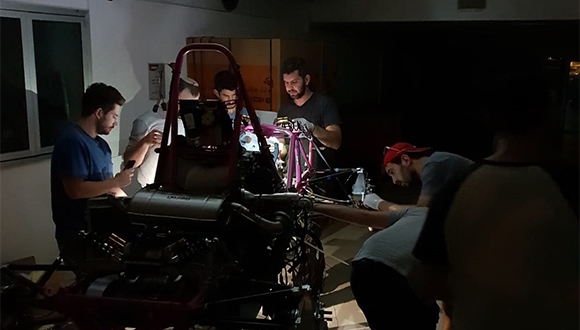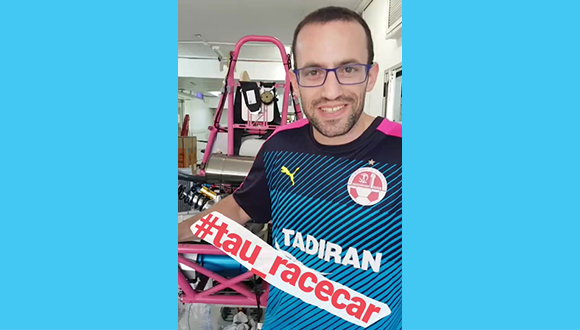
TAU’s race car is headed to Italy
Team of engineering students who constructed the car entirely by themselves will compete internationally
The students of the Formula project designed and built a race car as part of their final project in Mechanical Engineering. Now, after a year of hard and challenging work, they are preparing for the cherry on the cake – participating in the Formula ATA competition, where they will compete with students from all over the world for the honor, glory and of course, the trophy, of coming first.
Getting your hands dirty
Fifteen students and instructors from the Faculty of Engineering of the Iby and Aladar Fleischmann Faculty of Engineering at Tel Aviv University will travel to Italy at the end of July – the country is one of the world’s leading manufacturers of rare sports cars. In the belly of the plane will rest their race car, which they spent an entire year building, as part of their final project for their Bachelor’s degree. This is the only project at the faculty that requires a manufacturing process (not just planning and design) and is one of the university’s flagship projects as a result. It’s the result of collaboration between all the schools of engineering that comprise the faculty – Electric/Software, Materials, and of course Mechanical. The project is led by the School of Mechanical Engineering, and headed by by Prof. Yoram Reich.
“Our goal was to design and manufacture a vehicle the way a real engineering company does it, with all that that entails,” says Nadav Gvaram, a fourth year student who is taking part in the project. “The entire project is divided into sub-projects according to the different systems in the vehicle, such as the chassis design, the wheel assembly, the cab, the steering system and more, and is executed according to the competition rules (about 120 pages that specify the requirements and nature of the competition), which we can now quote even in the middle of the night,” he adds with a smile.
“I’m very excited about the trip,” says team leader Dima Medvednik, a Bachelor’s degree student in Mechanical Engineering, who has been part of the project for five years. “Two years of very intensive work have all led to the past two weeks and to this competition.” The rest of the group attests to him being the most extensive source of knowledge in the project.

Is there a screw loose? The Formula Team tightens and examines each element of the race car
The unique project gives students practical experience in planning and assembling a product. “There’s a real a win-win situation here both for our graduates and for the industry,” explains the project manager, Baruch Meirovich. “Most of the students come to us without hands-on knowledge, and this work gives them practical tools for real life, where they get their hands dirty and can go into the industry with more experience. And beyond the pride we feel at the School of Mechanical Engineering, we also feel like we’re representing our country internationally.”
#tau_racer: Nadav Gvaram’s debut story about the car on Instagram
International standards
Tel Aviv University is one of three universities in Israel (alongside the Technion and Ben-Gurion University), which traditionally participates in annual international competitions of this kind. This year, TAU’s race car will be the only Israeli representative at the competition in Italy, along with 46 cars from universities all over the world, including India, Egypt, Spain, Ukraine, Thailand and more. The requirements for admission to the competition are very strict, and currently the waiting list, two weeks before the event starts, stands at 32.
The cars are tested according to many parameters. Even the business plan and production costs are scored. With a low budget, comprised mostly of sponsorships from companies like Xenom, HP and others, students acquiring the spare parts and build the entire car themselves, from the chassis to the engine.
“There are static tests, that examine mainly the design of the main systems and the quality of the assembly, and then there are of course the dynamic stages in which the cars get on the track,” explains Gvaram. The car’s driver, who must meet stringent height and weight criteria, drives the vehicle first on the acceleration track, which the ability to accelerate the vehicle along a straight path is tested. He then competes in another track called “skidpad”, where the car is tested on its maneuvering abilities. The race culminates on the last day, as cars compete on the “autocross” race track, that examines the overall dynamic abilities of the vehicle, and then on an endurance track that is 22 kilometers long and identical to the autocross.
As befits a competition of this calibre, the car with the highest score earns its team a cup and of course, enormous respect. “I don’t know if there’s another major prize like this, but I can say that this will certainly be enough for us,” says Gavram.
Featured image: Part of the team who spent a year building the race car from scratch

